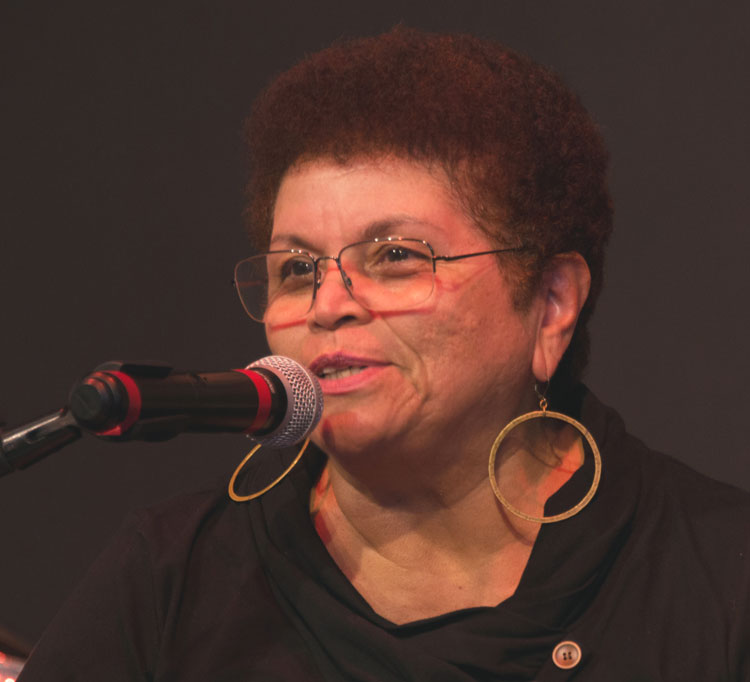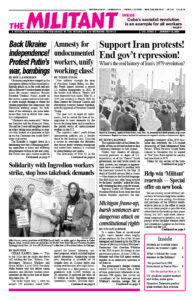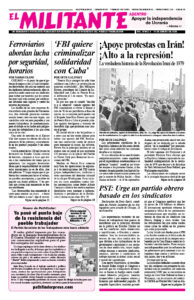“Puerto Rico has always had activities in solidarity with Cuba and the Cuban Revolution,” Milagros Rivera, president of the Cuba Solidarity Committee in Puerto Rico, told the Militant Jan. 2. “It’s our right to travel there.”

That’s why the committee “decided to take the offensive” when FBI agents began visiting or calling more than 70 of its supporters at the end of August, mostly participants in last July’s Juan Rius Rivera Brigade from Puerto Rico to Cuba, to harass them and attempt to dig up something they can use to target the group.
The committee sounded the alarm and let brigadistas and others know there is no reason you have to talk to FBI agents. They called a well-attended press conference to denounce the harassment. In October, Rivera was the featured speaker on a panel attended by 120 people at the People’s Church in New York to denounce the FBI’s moves.
Many in Puerto Rico are well aware of the FBI’s history of spying on and attempting to disrupt pro-independence groups, unions and other opponents of U.S. domination of the island. This has included frame-ups of Nationalist leaders like Pedro Albizu Campos and giving the green light to rightist thugs to assassinate independence supporters and partisans of the Cuban Revolution in the 1960s and ’70s.
In 1985 Rivera saw firsthand the FBI’s trampling of constitutional rights there as it carried out raids and arrested alleged members of the Macheteros, a pro-independence group accused of robbing a Wells Fargo shipment in Hartford, Connecticut, in 1983.
‘Just a talk over coffee’
This time the FBI agents claimed they just wanted to talk over coffee, falsely claiming the brigade had been infiltrated by Cuban agents or had broken an unnamed federal law. No one fell for it.
All of this had an impact she said, with no known attempts by the FBI to contact people for several months.
“But we can’t get overconfident,” Rivera said. “They sent a lot of agents here for several days. They spent a good deal of money. Their campaign to criminalize solidarity with Cuba and step up the economic blockade of Cuba continues.”
“They think that since we’re a U.S. colony we have to follow the rules that they establish and that those of us who live in the colony are also their possession.”
Rivera noted that the committee has organized brigades to Cuba for 30 years, but this is the first time the brigades have faced FBI harassment. “We don’t have any hidden agenda, everything we do is public,” Rivera said. “In that sense we are an open book.”
“Because it is a U.S. colony, we see the conditions of our country deteriorate every year. Privatizations, including of the electrical grid, have caused a lot of damage,” she said. Rivera, who works at the office of the UTIER electrical workers union office, has been part of the fight against privatization.
In the last few years the FBI has tried to change its image in Puerto Rico, arresting a large number of government officials for corruption. “Some people here have applauded them for that,” Rivera said. “But is the FBI acting legally? It’s like with Donald Trump. Many people were happy when his home was raided. But we can’t applaud the actions of the political police of the empire. They want to do the same thing to us.”
“I know some people who voted for Joseph Biden for president,” hoping he would ease up the economic war against Cuba, Rivera said. Instead, he’s increasing the squeeze. “We see that it’s really just one party, the liberalism of the Democrats is cosmetic.”
Now the Democrats are pushing a binding referendum to allegedly end “colonialism” in Puerto Rico, with a choice between independence, statehood or a “sovereign” government. Many Democrats hope statehood would win, giving them the chance to put two more party members in the Senate.
“The Democrats are just speaking pretty words to win the Puerto Rican vote in the U.S.,” Rivera said. “But for any referendum to be legitimate, first there has to be a transference of power to Puerto Rico; otherwise it would just be a circus.”
“We don’t control our own agriculture, fishing, relations with other countries. Whenever there is resistance they try to sidetrack us with referendums.”
The Cuba Solidarity Committee is not letting the FBI get in the way of its plans for continuing solidarity with Cuba. Its next brigade to Cuba will participate in the celebration of the 70th anniversary of the July 26 attack led by Fidel Castro on the Moncada Barracks in Santiago de Cuba. This opened the revolution that a few years later overturned the U.S.-backed dictatorship of Fulgencio Batista, brought workers and farmers to power and made the first socialist revolution in the Americas.

